OECD report launched in Brussels
The unique OECD report on northern Sweden, Finland and Norway was presented in Brussels on the 13th of March. The network of Northern Sparsely Populated Areas, along with the OECD and the Committee of the Regions, had the honour to host the launch of this “Territorial Report”, carried out by the OECD on the 14 NSPA regions.
A territorial review, conducted over the past two years by the Organization for Co-operation and Development (OECD) on the 14 regions in the Northern Sparsely Populated Areas, NSPA, was officially published on 13th March. The publishing of the OECD report on the NSPA was highlighted at a launch event arranged by the NSPA network, together with the OECD, at the European Committee of the Regions in Brussels with high-level representatives from the EU, national governments and the NSPA.
Future development depends to a large scale on fostering infrastructure, increasing the use of e-technologies within the service sector and creating new employment opportunities in the small and medium enterprises refining forestry, mining and natural resources. Only regional strategies, tailored to the strengths and advantages of the regions, can make this development possible.
This is the main argument stated in the unique OECD report on northern Sweden, Finland and Norway, that was presented in Brussels on the 13th of March. The network of Northern Sparsely Populated Areas, along with the OECD and the Committee of the Regions, had the honour to host the launch of this "Territorial Report", carried out by the OECD on the 14 NSPA regions.
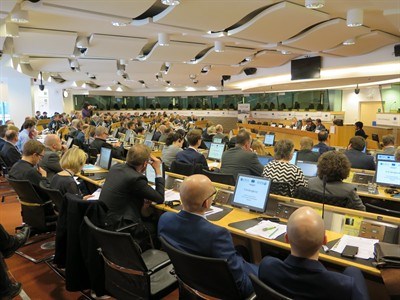
The launch of the OECD report on the NSPA in the Committee of the Regions has drawn considerable public attention.
Considerable interest in the OECD report on the NSPA
On the 13th of March the OECD report on the NSPA was revealed to public in Brussels in the conference room of the Committee of the Regions, to a capacity audience of representatives from the EU, national level and different regions and sectors.
The OECD, the Organisation of Economic Cooperation and Development, is a collaboration of 35 developed countries and is recognized as the world's leading research institute advising governments on tackling the economic, social and governance challenges of a globalized economy. In this report the OECD has scrutinized the economies of the 14 regions of the NSPA network, comprising the northern portions of Sweden, Norway and Finland. These regions have many similar challenges, such as sparsely populated areas, inhospitable climate and large distances, that distinguish them from the rest of Europe. At the same time, this alikeness is diluted by striking dissimilarities that make NSPA a unique case to study, as the OECD points out.
This study is highly important for the economic growth and the regional development of Northern Europe in its cooperation with the EU, as well as its neighbouring countries and regions.
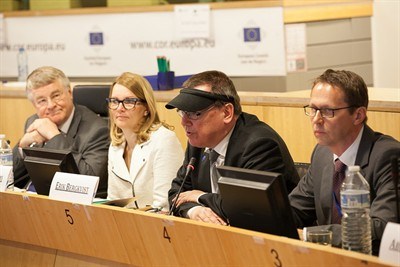
Erik Bergkvist (second right), Region Västerbotten, welcomed all to the seminar and introduced the key note speakers Markku Markkula (left), President of the European Committee of the Regions, and Mari Kiviniemi (second left), Deputy Secretary-General of the OECD. Mikael Janson (right), North Sweden, opened the ceremony by presenting the coordinators of the study, beside himself; Kari Aalto, East & North Finland, Trond Haukanes, North Norway and Zofia Tucinska, Mid Sweden.
Large support of the OECD study of the NSPA
The launch of the OECD report in Brussels gathered the representatives of 14 regions. The conference commenced with the presentation given by Erik Bergkvist, the chairman of Västerbotten Region, who cordially welcomed all the participants and described the general background of the report and its meaning for the NSPA.
Opening speeches were given by the eminent actors in the sphere of regional development. First, Markku Markkula, the President of the European Committee of the Regions, took the floor and underlined the importance of this unique cooperation of the NSPA network with the OECD. He underpinned the regions' role in the development of the EU and Europe and the need for cooperation to create sustainable smart growth in Europe as a whole, giving some personal memories from his travels over the borders in northern Finland, Sweden and Norway.
He was followed by the Deputy Secretary-General of the OECD Mari Kiviniemi, who enlightened the audience with the major challenges currently facing NSPA regions, and explained how the results of this report could be beneficial to the other OECD members, struggling with the similar problems. At the same time, Mari Kiviniemi praised NSPA members for close cooperation and declared: "NSPA has significant opportunities and has an important geopolitical role in Europe".
Finally, Normunds Popens, Deputy Director-General at the European Commission, identified the importance of the way in which the study was carried out. He insisted that getting to the roots of the issue by traveling to the regions in question is the only way to genuinely understand a region's development, and that is what strongly characterizes this OECD study and makes it so valuable in terms of its recommendations.
Moreover, Normunds Popens marked the timeliness of the report, as it came out as the discussion on the so called "the EU post-2020 era" had begun, and the future of the cohesion policy, its importance and its funding is being actively debated. He called upon the regions to address their governments and demonstrate the successful cooperation that the cohesion policy has enabled, pointing out the NSPA as the successful example of this.
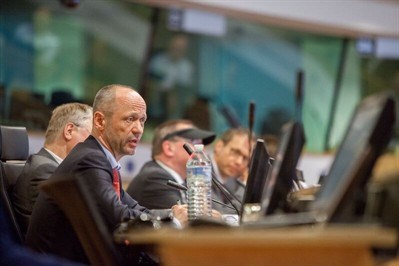
Normunds Popens, Deputy Director-General at DG REGIO, concluded the opening speeches by pointing out that the NSPA represents a good example for other regions and that it is important to demonstrate its success in order to ensure the EU support for regional development.
The OECD gives policy recommendations to the northern EU regions
The report was presented by Chris McDonald, Policy Analyst from the OECD's Regional Development Policy Division, who has led the work with the report on the NSPA. He began his presentation by providing a general description of the NSPA regions, their challenges and strong sides. He pointed out that within the context of the OECD these regions are relatively wealthy and are generally experiencing above-average growth. However, they are generally under national average in many factors important for growth in each national context. He noted that the NSPA regions are becoming closer to each other with regard to their GDP per capita which could enhance the potential for fruitful collaboration among them. According to the results of the report, the NSPA regions face shared policy challenges in spite of significant internal diversity, such as remoteness, harsh climate, few people and long distances and dependency on natural resources.
After scrutinizing the peculiarities of the NSPA development, the OECD presented a large number of policy recommendations that need to be implemented on the national level, together with joint efforts within the NSPA and the EU networks. Above all, the OECD insists that it is highly necessary to shape tailored strategies on the local, national and regional levels in order to be able to foster successful regional development.
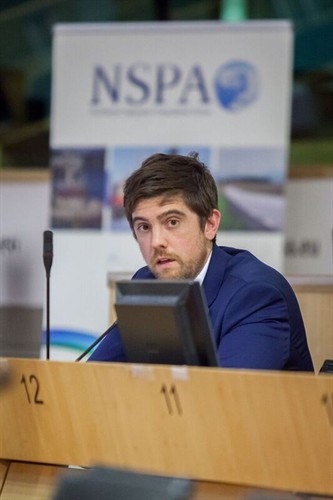
Chris McDonald, who has led work on this report, gave a brief summary of the OECD's analysis and recommendations to the NSPA regions.
-It is vital for the northern regions to identify their absolute competitive advantage and to focus on its development in order to create Smart Specialization, - declared Chris McDonald.
Among other things, the OECD has underlined that the access to natural resources has been an undisputably strong advantage of the NSPA regions. The next step should be to develop products refining through the small and medium enterprises. If this effort is successful, it could potentially create many employment opportunities, primarily in the sparsely populated areas. In turn, this is a vital measure that would stop the youth from emigrating from these regions and make them attractive to the younger labour force, according to the OECD.
Moreover, the report reveals the dissimilarities between the smaller communities and the larger cities with their more extensive growth potential, enabled by healthcare, innovation and IT-development. The OECD points out that it is highly important to find a way to connect these cities with the rural areas by linking regional and rural development policies.
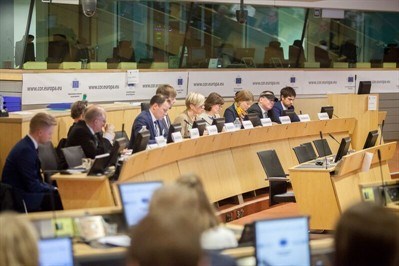
Panel discussion with the representatives from the EU, the NSPA regions and national governments of Sweden, Norway and Finland was led by Abel Schumann from the OECD.
Panel discussion from all angles and perspectives
The presentation of the OECD territorial review on the NSPA was followed by the lively panel discussion, led by Abel Schumann, Economist at the OECD's Public Governance and Territorial Development Department. The participants made several remarks on the importance of this study and the following work to implement its recommendations. Søren Kissmeyer, Senior Expert at DG AGRI claimed that in line with the OECD results, he finds the improved cross-border collaboration to be of an extreme importance for the NSPA regions. He stated that the NSPA joint efforts are an example of the best practice when it comes to the regional coordination of funds.
Regarding the OECD's policy recommendations, Søren Kissmeyer admitted: "I'm happy to see that they go hand in hand with those policy tools that DG AGRI tries to make available to the rural areas, namely broadband, innovation and research, tourism and technology".
Jen Nilsson, the Member of the European Parliament, discussed the future of the negotiations on the cohesion policy in the EU. He highlighted the need to make a better use of regional funds and to simplify the rules of applying for financing on the national level. As Jen Nilsson is leading work in both the REGI and TRAN Committees in the European Parliament, he paid specific attention to the fact that the OECD report emphasizes the importance of the well-functioning transport corridor in the Northern Europe. Jens concluded the panel discussion by expressing hope for the better regional cooperation:
"I have a dream... that the next time national ministers of transport have a meeting, the NSPA regions are coming to this meeting together, demonstrating the ministers what should be done".
Tomas Norvoll, Nordland County, who together with Pentti Mäkinen, South Savo County, and Erik Bergkvist, Region Västerbotten, represented the NSPA in the debate, put forward the need for the regions to step up in the value chain, exemplifying with Norwegian cod that when the fisherman land it in North Norway it is worth a few Euro, but when leaving the region, reaching the customer, is worth many times more.
Elisabeth Backteman, State Secretary at the Swedish Ministry of Enterprise and Innovation, Kaisa-Leena Lintilä, Director at the Finnish Ministry of Economic Affairs and Employment and Grete Ellingsen, State Secretary at the Norwegian Ministry of Local Government and Modernisation, represented the national governments and gave their support for the OECD study and the unique cooperation in the northernmost Europe. The study provides a good basis for continued dialogue with the regions and also in a Nordic and European context to deliver adapted tools for sustainable growth from the states concerned.
All panelists agreed on the importance of the cooperation in the NSPA and the added value the OECD study brings to this cooperation, as well as the dialogue on concrete actions on also national and EU level; even while perhaps not agreeing on all issues and with some things needing to be more analyzed and discussed for the future. Marie Kiviniemi from the OECD wrapped the launch event up by giving a thank-you to all for being a part of making this (also for the OECD) important report, and Pentti Mäkinen closed the seminar on behalf of the NSPA regions.
Read the whole OECD report on the NSPA regions here.
Read policy highlights of the OECD report on the NSPA regions here.
The presentation slides of the OECD report can be found here.
